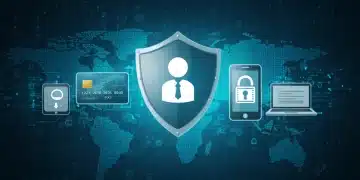Lifelong learning: how to stay competitive in your career

Anúncios
Lifelong learning is essential for remaining competitive in today’s job market, emphasizing continuous skill development and professional networking to enhance career growth and adaptability.
Lifelong learning has become a key factor in staying competitive in today’s fast-changing job market. Have you considered how constantly evolving your skills can open new doors for you? Let’s explore some effective approaches.
Anúncios
Understanding lifelong learning
Understanding lifelong learning is vital in today’s rapidly changing world. It refers to the ongoing, voluntary, and self-motivated pursuit of knowledge for personal or professional development. As industries evolve, adapting and expanding your skills helps maintain a competitive edge.
Definition and Importance
Lifelong learning isn’t just about formal education. It includes learning from work experiences, social interactions, and even personal hobbies. This diverse approach to learning supports flexibility and adaptability in your career. With new technologies emerging, embracing lifelong learning can enhance your job security.
Benefits of Lifelong Learning
Engaging in lifelong learning offers numerous benefits. Here are a few key advantages:
Anúncios
- Improves job prospects
- Increases adaptability
- Promotes cognitive health
- Enhances personal satisfaction
By continuously updating your knowledge and skills, you position yourself as an asset in your workplace. Moreover, lifelong learning contributes to personal fulfillment, allowing you to explore new interests and passions.
Another significant aspect is how lifelong learning strengthens professional relationships. Sharing knowledge with colleagues or engaging in group learning fosters teamwork and collaboration. These connections can lead to new opportunities and insights, enriching your understanding of your field.
Types of Lifelong Learning
Lifelong learning takes many forms. It can be formal, such as enrolling in courses or obtaining certifications, or informal, like watching online tutorials or attending workshops. Here’s a brief overview of some types:
- Online courses and webinars
- Workshops and conferences
- Mentorship programs
- Self-directed learning through books and videos
As you explore these options, consider what fits your learning style best. The key is to find ways that resonate with you, making the process enjoyable and impactful.
In conclusion, understanding lifelong learning is crucial for staying relevant in today’s job market. It enhances your skills, builds valuable connections, and enriches your life. Embrace the journey of continuous learning, and you’ll find endless opportunities ahead.
The importance of continuous skill development

The importance of continuous skill development in your career cannot be overstated. As industries and technologies evolve at a rapid pace, keeping your skills up to date is essential for career advancement and job security. When you actively seek to improve your abilities, you not only increase your value to employers but also boost your confidence in your work.
Why Continuous Skill Development Matters
In a competitive job market, those who embrace continuous learning often stand out. It allows professionals to adapt to new technologies and methodologies, making them more versatile. Staying relevant in your field leads to better job opportunities and career growth.
Additionally, continuous learning fosters innovation. By exploring new skills, you can bring fresh ideas and perspectives to your work. This innovation can help your organization solve problems more effectively and stay ahead of competitors.
Key Benefits of Continuous Skill Development
Consider the following benefits of pursuing ongoing skill development:
- Enhanced employability in a dynamic job market
- Greater adaptability to changes in technology and industry demands
- Improved job satisfaction and engagement
- Increased potential for promotions and salary raises
Continuous skill development can also create networking opportunities with professionals who share similar interests. Engaging with peers in your field helps build connections that can lead to mentorship and collaboration. These relationships can be invaluable as you navigate your career path.
Furthermore, keeping your skills fresh can prevent stagnation. It can be easy to fall into a routine and stop growing, but continuous learning pushes you to explore new challenges. Whether it’s taking a new course, attending seminars, or participating in online discussions, each effort contributes to your overall growth.
Ultimately, prioritizing continuous skill development is a proactive choice. It empowers you to take charge of your career, adapt to changes, and seize opportunities as they arise. Embrace this journey of lifelong learning and unlock your full potential.
Strategies for effective lifelong learning
Strategies for effective lifelong learning can help you stay competitive in your career. By adopting thoughtful techniques, you can ensure that your learning journey is both rewarding and productive. Here are some impactful strategies that can guide you.
Set Clear Goals
Establishing clear learning goals gives direction to your efforts. Ask yourself what skills you want to acquire or improve. Setting specific, measurable, attainable, relevant, and time-bound (SMART) goals can help maintain focus.
Utilize Online Resources
The internet is filled with valuable resources for learning. Online courses, webinars, and educational videos offer flexible options to gain knowledge. Consider platforms like Coursera, Udemy, and LinkedIn Learning to access a variety of subjects.
- Choose a course that fits your schedule
- Participate in online discussions and forums
- Take notes to reinforce learning
- Set a consistent study time
Utilizing these resources not only enriches your knowledge but also connects you with other learners. This interaction can enhance your understanding and provide diverse perspectives.
Engage in Networking
Networking with professionals in your field can open many doors. Attend industry events, join professional groups, or engage in online forums. Sharing experiences with others can offer new insights and inspire your learning.
Moreover, seeking mentorship can be invaluable. Learning from someone with more experience can provide guidance and help you navigate challenges. Regularly engaging with your network keeps you updated on industry trends and opportunities.
Make Learning a Habit
Incorporating learning into your daily routine is key. Even setting aside just 15 to 30 minutes a day can lead to significant progress. Whether it’s reading articles, listening to podcasts, or practicing new skills, consistency is essential.
Additionally, track your progress and celebrate small achievements. Recognizing your growth can motivate you to continue your learning journey. By integrating these strategies into your life, you can transform learning from a task into a lifelong habit.
Online resources for skill enhancement

Online resources for skill enhancement are more accessible than ever, providing an incredible range of learning opportunities. Today, anyone can level up their skills from the comfort of their own home. With the right tools, you can tailor your learning experience to fit your needs and goals.
Types of Online Resources
There are various types of online resources available to help you enhance your skills. These include:
- Online Courses: Platforms like Coursera and Udemy offer structured courses on many subjects.
- Webinars: Live seminars conducted online provide insights from industry experts.
- YouTube Channels: Educational channels cover everything from coding to cooking, offering free tutorials.
- Podcasts: Listening to experts share knowledge while on the go can expand your understanding of different topics.
Choosing a mix of these resources can keep your learning dynamic and engaging. For example, you can take a course to gain a foundation and then supplement it with videos for practical applications.
Benefits of Using Online Resources
Utilizing these resources comes with numerous advantages. Firstly, online resources are often flexible, allowing you to learn at your own pace. You can revisit materials whenever necessary, reinforcing your knowledge. Additionally, many resources are free or low-cost, making education more affordable.
Engaging with interactive content helps solidify your understanding. Quizzes and projects often accompany online courses, promoting active learning. This approach not only improves retention but also allows you to apply what you’ve learned in real-world scenarios.
Networking is another significant benefit. Many online platforms include forums or community spaces where learners can connect. Engaging in discussions with peers can enhance your experience. It also opens the door to collaborative projects, which can further your learning journey.
Ultimately, online resources for skill enhancement provide a wealth of opportunities. They empower learners to take control of their education, making it easier than ever to stay competitive in today’s job market.
Building a professional network for growth
Building a professional network is essential for career growth. Strong connections can open doors to new opportunities, mentorship, and collaboration. Networking is not just about online connections; it’s about fostering relationships that support your career journey.
Benefits of Networking
Developing a professional network provides several advantages. Firstly, it enhances your visibility in your industry. People are more likely to think of you for job opportunities if they know about your skills and experiences. Additionally, a solid network can help you learn about trends and changes in your field.
- Access to Job Opportunities: Many jobs are filled through referrals, so building relationships can enhance your chances of being recommended.
- Learning and Development: Your network can provide insights, advice, and mentorship, helping you grow professionally.
- Support System: Having a network means having a support group that understands your industry, providing encouragement and resources.
Networking also fosters collaboration. When you connect with others in your field, you may discover new partnerships or projects that benefit both parties. These collaborative efforts can lead to innovation and creativity.
How to Build Your Network
To build a professional network, start by attending industry events, workshops, and conferences. These venues provide excellent opportunities to meet others in your field. When meeting someone new, don’t hesitate to introduce yourself and share your interests. Follow up with a personalized message after the event to keep the connection alive.
Online platforms like LinkedIn are great for networking as well. You can join groups related to your interests, participate in discussions, and share valuable content. Engaging with others online can lead to meaningful connections and expanding your network beyond geographical limitations.
Regularly nurturing your relationships is important. Checking in with your contacts periodically shows that you value the relationship. You can offer help or resources when possible, which can strengthen your network continually. Remember, networking is a two-way street; offer support to others while also seeking it for yourself.
FAQ – Frequently Asked Questions about Lifelong Learning and Networking
What is lifelong learning?
Lifelong learning is the continuous pursuit of knowledge and skills throughout your life, helping you adapt to changes in your career and personal interests.
How can professional networking benefit my career?
Networking can lead to job opportunities, mentorship, and collaborations, significantly enhancing your career growth and potential.
What online resources can I use for skill enhancement?
You can use online courses, webinars, and educational platforms like Coursera, Udemy, and LinkedIn Learning to improve your skills.
How often should I engage in networking activities?
Regularly engaging in networking activities, such as attending events and connecting online, helps maintain and grow your professional relationships.





